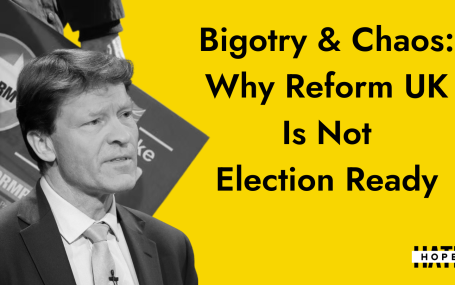HOPE not hate uses cookies to collect information and give you a more personalised experience on our site. You can find more information in our privacy policy. To agree to this, please click accept.
A headscarf wearing beauty blogger has pulled out of a L’Oreal campaign because of the “conversations surrounding it”. Her decision follows controversy over tweets she posted four years ago which some have branded as anti-Israeli and containing antisemitic tropes.
When Amena Khan became the first women in a hijab to be part of a mainstream advert for hair care last week, L’Oreal was celebrated for its inclusiveness and breaking of barriers. As could be expected, Khan, who runs the Pearl Daisy fashion blog, also received racist and Islamophobic abuse on social media.
However, a few days later a right-wing US media outlet, the Daily Caller, published her tweets from 2014 during the Gaza conflict. Khan criticised Israel by calling it a “sinister state” full of “child murderers” as well as equating it to the Pharaoh.
She has been accused of replicating antisemitic tropes such as Jewish conspiracy theories and blood libel.

The beauty blogger has since apologised and stepped down from the campaign “with regret”. She announced in an Instagram post that the controversy over her tweets “detract from the positive and inclusive sentiment that [the campaign] set out to deliver”.
She added: “Championing diversity is one of my passions, I don’t discriminate against anyone.”

A spokesperson for L’Oreal Paris, told BBC Newsbeat: “We appreciate that Amena has since apologised for the content of these tweets and the offence they have caused.
“L’Oreal Paris is committed to tolerance and respect towards all people. We agree with her decision to step down from the campaign.”
Anti-Muslim activists such as Pamela Geller have worked hard to push a negative narrative around the incident, with phrases including “the beauty is a beast” and that “[Khan’s] antisemitism is tolerated because she wears a veil”.
These extremists have also criticised L’Oreal for hiring a headscarf-wearing woman for their campaign, calling it “the height of submission and stupidity”.
“Geller and her ilk use an example of misbehaviour as broader evidence towards a whole group that they homogenise,” said Joe Mulhall, senior researcher for HOPE not hate. “A woman tweeting something antisemitic should not be expanded to demonstrate that all Muslims hate Jews.”
The debate on Twitter has been especially polarised by the fact that Amena is Muslim, and has some calling it double standards or inaccurately equating different behaviours.
Amena has stepped down from the L’Oréal campaign after her old tweets criticizing Israel were unearthed.
-another situation where women of colour are good enough to front a campaign.. until they have an opinion.
Then all hell breaks loose. https://t.co/KstXcapEaN— Media Diversified (@WritersofColour) January 22, 2018
Khan also has a huge following, many of them young Muslims outraged at what they see as silencing anti-Israel protests, with many not taking into consideration the antisemitic tropes associated with the language of the tweets (now deleted) as the reason for the controversy, rather than criticism of the Israeli government’s actions.
You can be made to step down from your modelling job for supporting Palestine. American zionism has no limits.
Anything remotely anti-Israel threatens your career, your lifestyle, and even your hobbies, in the land of the free! ???????? #Loreal #amenakhan— Nur Al-Abrar (@southiraqi) January 22, 2018
Allowing the far right to control the narrative and hijack how this controversy develops is counter-productive. Khan has already apologised for the tweets. What is now important is to establish dialogue. We must educate on the power of language rather than polarise.
When Naz Shah, the Bradford West MP, made comments deemed to be antisemitic and was forced to step down as a Parliamentary Private Secretary, she entered into dialogue with Jewish community organisations to combat what she called her ignorance over antisemitism being racism.
Nisa-Nashim, a Muslim and Jewish women’s organisation, has already planned to invite Khan to meet and discuss the issue with them. Such, sometimes difficult, conversations are very much needed to avoid the far right’s message of division.

HOPE not hate reveals ANOTHER shameful Reform UK candidate – and lifts the lid on the party’s chaotic selection process UPDATE: Reform UK has DROPPED…